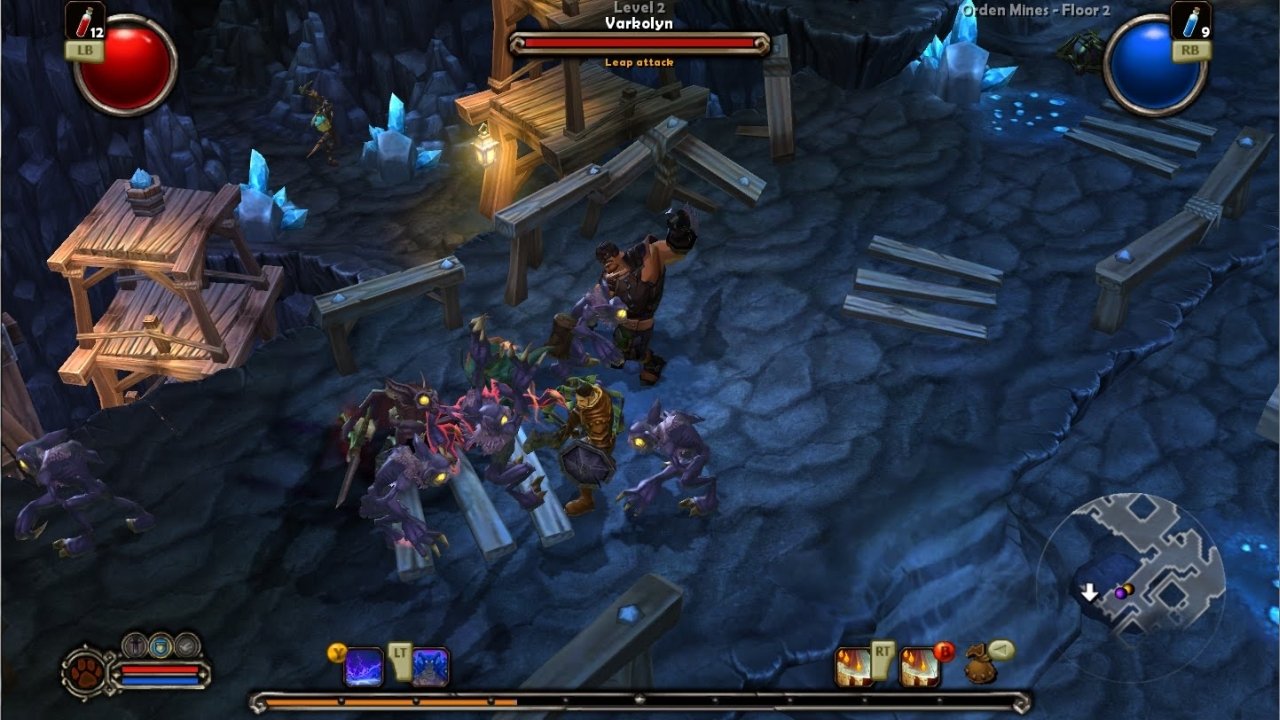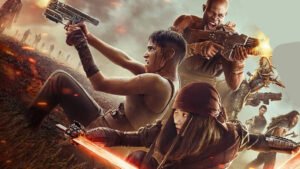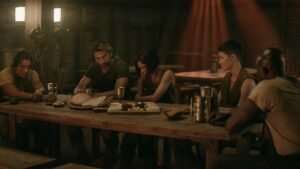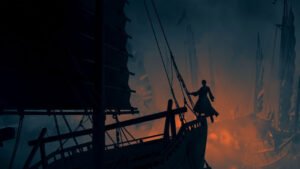Before Runic Games and Torchlight, you used to be the co-founder of Blizzard North if I’m not mistaken?
Correct. My brother who’s with us at Runic still and a third guy, David Brevik, started up a little game company called Condor Incorporated in 1983. We did a few Game Gear and Game Boy titles as well as a Sega Genesis game before we got a contract to do our first PC game which was Diablo.
Halfway through making Diablo Blizzard bought us and we became Blizzard North where we stayed for almost 10 years.
So, you come from this background creating the tour-de-force of the action-rpg/dungeon crawler genres. Leaving there and going to Runic and developing Torchlight, what was that transition like for you personally?
Well, it’s a lot different now. Between Runic Games and Blizzard there was the ill-fated 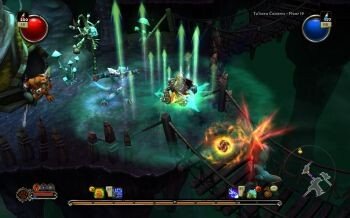 Flagship Studios. So, we got a taste of doing things right and then shortly after we got our taste of failure as well. I think the biggest thing for us moving forward was learning how to make a game company that doesn’t have all the Blizzard resources and luxuries behind it. I think we’re now more realistic about business and therefore have really put a lot of work in to improving our game development process and efficiency.
Flagship Studios. So, we got a taste of doing things right and then shortly after we got our taste of failure as well. I think the biggest thing for us moving forward was learning how to make a game company that doesn’t have all the Blizzard resources and luxuries behind it. I think we’re now more realistic about business and therefore have really put a lot of work in to improving our game development process and efficiency.
As you can see, we’re still making the same genre of games – we joke that it might be our only marketable skill in this world – but we’re doing it a lot more efficiently now and a lot smarter than we used to do it.
It does seem that efficiency has been the key to your success; we don’t often hear about small, downloadable games being such a success. Do you feel it was just a matter of right product and right time, or was there something else contributing to its success other than the quality?
I think there are a variety of things there; I think we’re staking out ground that very specifically and deliberately doing it and that’s the gap between the $50 million budget AAA titles and the small sort of Bejeweled casual titles. We’re staking out the middle ground in this yawning gap between fun little games and these things that take 5 years to make.
We felt there was a lot of room in the middle there where we could make things that were just as much fun to play as the big games but we could get them out faster and charge less for them. I also think at the same time the business was sort of making a change away from the box market maybe where the PC section at Best Buy is getting smaller and smaller all the time and heading to digital download. So, I think we had a good timing with a product that sort of had an emphasis on digital download, getting on Steam and places like that. I think we were the beneficiary of good timing with that but we were also targeting a market that was underserved.
Part of that efficiency and keeping within the confines of a smaller production scale is knowing what features to cut. With the first Torchlight game, multiplayer was thrown right out the window. How do you decide what is necessary for the game to be a success versus what would just be a benefit to the player?
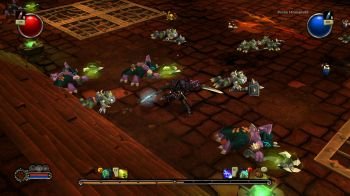 You hit right on the hardest decision we had to make; do we start with just a single player or come out with multiplayer right off the bat? There were other decisions we had to make that weren’t so difficult like not having movie-quality cinematic or super high-end graphics technology. Those were easier, but the toughest decision was deciding whether there would even be a market for a single player game like this.
You hit right on the hardest decision we had to make; do we start with just a single player or come out with multiplayer right off the bat? There were other decisions we had to make that weren’t so difficult like not having movie-quality cinematic or super high-end graphics technology. Those were easier, but the toughest decision was deciding whether there would even be a market for a single player game like this.
Eventually we decided to do it, mostly because we could get a game on the shelf a lot faster; it would have added another 8 months or so to the project. Plus, we’d have to develop our multiplayer technology, plus our basic game tools, plus our graphics technology at the same time. We wanted to make sure that whatever we did, we did it right. So we focused on doing something simpler that we could get done in a reasonable amount of time.
But, looking at the roadmap you guys outlined very early on, it seemed like multiplayer was something you always something you wanted. Now Torchlight 2 is adding the multiplayer and continuing this gradual sort of evolution.
I think with Torchlight we wanted to go from making the single player game to a semi-traditional MMO experience. Later on we decided that the next step should be to a basic co-op multiplayer version of this. I think this sort of game calls out for it and as a result, we’re having a really good time making Torchlight 2.
Other than the multiplayer though, what can players expect that’s new to Torchlight 2 that wasn’t in Torchlight originally? Some are saying this is the old game re-bundled.
Well, with Torchlight people were always saying “well, this is great but tack multiplayer on to it”. So, it became part of our thought process; we went and thought about doing it as an expansion or make Torchlight 2 by tacking multiplayer on Torchlight 1. But, we felt that would seem cheap and like we were trying to sell the same game again.
So, Torchlight 2 is entirely new. All the character classes are new, and they’re more customizable; you can pick male or female. The levels are bigger spaces to accommodate more players and their pets/summonables.
Then rather than doing an expensive client/server model with subscriptions or item sales we decided to do a basic peer-to-peer model that’s designed to be played with your friends. The upside to this is that it’s only a single purchase but the downside is that the multiplayer isn’t going to be this rock-solid, tight, cheat-free economy like you need in an MMO. It’s a moddable game like Torchlight 1, we give you our tools with the game so you can make your own levels and expansions but at the cost of sacrificing a cheat-free environment.
But apart from making the environments bigger what’s really changed? How has this keystone feature affected the game’s flow or mechanics?
Well, like I said the environments have been redesigned and scaled for multiple people in it. We also have to redesign the interface because you’re going to be trading and chatting and other multiplayer things that aren’t accommodated by the original interface.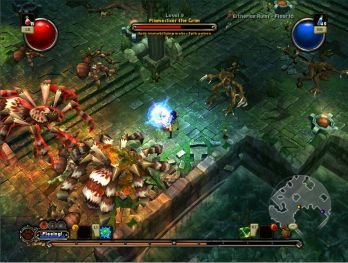
We also have to redesign all of the skills because you want support skills for when you’re working in a group. We needed to redesign older skills because there were times in Torchlight where you’re filling the screen with fireballs and your dog is summoning skeletons, and if you multiply that by four people then you’ve got a screen that’s basically full of fire and explosion. A lot of the rudiments of the game stay the same, but you really have to adjust a lot of things to accommodate 4 players on the screen.
You talked about giving the players control over their experience, but the tools sound similar to those provided in Torchlight 1. What new additions have been made to make these mods easier to implement?
We’re going to make the management of the mods much easier this time. You’ll be able to add and get rid of mods much easier this time. Joining a multiplayer game, players will be able to see what mods you have or what mods they need to get in order to play with you. We’re going to make things a lot more open and visible but the tools will be relatively similar to Torchlight 1.
Now, one thing we’re not going to do is regulate or officially sanction any fan-made mod. This will be something the community handles itself through fansites or community databases of all the mods. To some extent this will also include people in the community making mod manipulation tools, allowing you to add or edit mods. All of the hosting and distribution we’re leaving up to the community just like Torchlight 1, but we’re making them more accessible and visible in the interface of Torchlight 2.
You guys recently announced a delay for Torchlight 2 to July this year.
Well, we haven’t set a date. We’re still thinking summer, but it’s a situation where we want to make sure the game is done before we really commit to a date because we have the sort of iterative development where we’re constantly adding and removing things and it makes it hard to set a date. We’re still targeting the summer, and it might have been pushed with the XBLA game coming so soon but it’s still a very fast development cycle. We’re at a point where we’re officially not setting dates right now.
Well, as you mention in the much shorter term we’ve got the XBLA version of Torchlight coming. Tell us about transitioning a very PC-centric genre to the console because not very many titles have done this well at all.
We’ve been inspired by a few games that have made the transition but the list isn’t very long at all, Baldur’s Gate: Dark Alliance is one of the few that come to mind. But, that is really the whole project, getting the interface right so it feels like you’re playing Torchlight even though it’s with a controller.
A majority of the interface needed to be redesigned and more basic things like how you move, or swing or handle inventory. You only realize how much interface is in the game when you have to go back and redesign it all so it works with the controller. But, that was by far the most important part of the project and I think the success on this project will largely be a referendum on how well we did that.
Have there been any changes or modifications that make the game more accessible on the 360?
There’s a few things like having direct control of your character rather than clicking on the ground to move. So, we’ve done some tweaks with the melee combat like when you swing there’s a little half-step forward that keeps you in the focus of combat. The way the animations blend is also a little more fluid; like when you’re lobbing a grenade at something the distance is gauged by how far you pull the analogue trigger.
Most of these adjustments are to help you think about your character and the monsters and getting loot out of the room rather than your controller. If you’re not thinking about the controller too much then we’ve done our job.
I hate to make the comparison but back in October 2009 when you released Torchlight for the first time, Diablo III was this monster somewhere off in the distance but with every passing day it’s becoming more and more of a reality. Now with Torchlight 2 being a very similar game potentially coming out in the same year, what sort of trepidation do you face going in to this David and Goliath sort of battle?
Well um… There’s a few things happening here. First of all it’s been the threat over our heads since the very beginning, what happens when Diablo III comes out. I think first we’re all going to go out and buy it and play it a whole bunch, slowing down whatever it is we’re doing. But, once we’ve done that I think we’ll just get back on to doing our thing.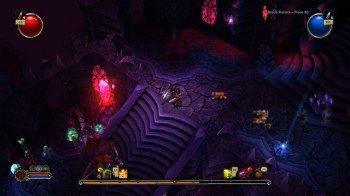
I think there’s going to be some key distinctions between the products; we’re moddable and they’re not, our game doesn’t require high-end graphics while theirs is aiming a little higher in complexity, we’ll be cheaper. But, who knows?
We’re kind of blessed by working in a genre where there’s only one source of real competition. We could be working on another game that has multiple genre competitors released every month. The fact that there’s only one big 500-pound gorilla is kind of good.
Speaking of other genres, you’ve been making these games forever. Do you ever want to try and do something else?
Absolutely, I think there’s still a lot we can do with the action-rpg genre and we’re just getting to the point where we can do something really special and push the envelope with it. While we really love doing what we do we always want to explore new things, but it’s a matter of fitting it in right now it feels like we’re tied in to making Torchlight for a while.
Well, until then we’ll look forward to the XBLA game.
Yeah, it’s our first console game in over 10 years. We’re pretty excited about the way it came out, but like when Torchlight came out we’re not really sure if there’s a market for this game but all signs point to yes so far.
